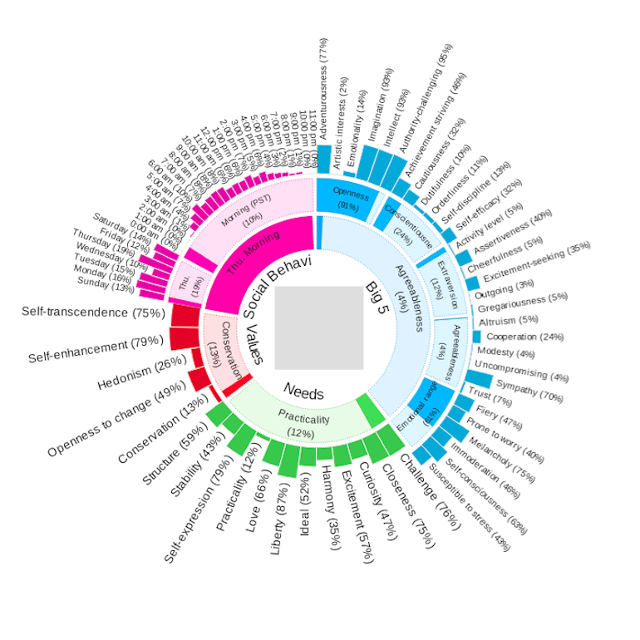IBM's Watson computer has branched out into social media consulting.
IBM recently worked with NPR tech reporter Aarti Shahani to analyze Shahani's personality based on her Facebook and Twitter posts with its Personality Insights API, and Shahani says the results were extremely accurate.

"It feels so spot on to me that I don't actually want to publish the pie chart that I got from Watson," she told Fast Company.
But Shahani was willing to share a sample of the computer's findings, which translated her social media writings into numerical measurements of the strength of dozens of her personality traits.
"It's a pie chart with about 50 traits, each with a percentile score: kind of like the SAT, ranking you compared to others," she said in an NPR segment discussing the experiment.
One clear result the computer found: a tendency to challenge authority. Watson gave her an 83% rating along that axis, something she says she found hard to disagree with.
"I guess that's a very consistent part of who I am, and even as it gets older it doesn't seem to fade," she says. "It's one of the findings that made me feel there's something to this."
Watson even picked up on some traits she feels might not be entirely obvious to those around her: Measuring extraversion, for example, the computer gave her a rating of just 35%, something she says might not be immediately obvious to those who see her interacting with others socially or professionally.
"I do need a lot of alone time, so it puts me in the lower end of extraversion in the universe of people that it's analyzed, and that seems to me actually pretty accurate, and even something that people who are close to me wouldn't necessarily get about me," she says.
The scientists behind Watson have trained the computer to use statistical models to map online writings to personality traits, something that's useful, not just for armchair psychology, but for other areas like targeted marketing.
"IBM also found that people with high openness and low emotional range (neuroticism) as inferred from social media language responded more favorably (for example, by clicking an advertisement link or following an account), results that have been corroborated with survey-based, ground-truth checking," according to the company. "For example, targeting the top 10% of users in terms of high openness and low emotional range resulted in increases in click rate from 6.8% to 11.3%, and in follow rate from 4.7% to 8.8%."
People who measure highly for "modesty, openness, and friendliness" are also more likely to retweet information when asked, company researchers have found.
Shahani says she was surprised to find Watson gave pretty similar assessments of her personality from both Twitter and Facebook.
"I really thought Facebook is the place where I'm myself, and Twitter is the place where I'm a snarky know-it-all," she says. "I really thought there would be a difference, but they were pretty consistent, so that surprised me."
It is, however, in line with studies that say personality is basically fixed after young adulthood, which Shahani says might also dissuade anyone who'd try to turn a Watson-style analysis into a guide for self-improvement.
It's also not clear how easy it would be to manipulate posts to change Watson's assessment, though it seems likely that if the stakes get high enough—if similar algorithms were being used for, say, hiring purposes, or something more dystopian still like China's proposed "social credit" ratings—someone will give it a try.
"If I knew that a potential employer could use this kind of tool to analyze me, would I then start to think about what kind of self am I portraying online, because there's certain kinds of jobs I want?" asks Shahani. "I could totally see people doing that."
Right now, IBM says some of its commercial partners are already working with Personality Insights and other Watson APIs to build tools around them.
"For example, StatSocial is a social data company that enables brands and publishers to understand, segment, and target their audiences on the web," an IBM spokesperson wrote in an email to Fast Company. "Using the Watson Personality Insights API, StatSocial analyzes social and blog content to identify the personality types, values, and needs of hundreds of millions of consumers across the world."
And for those who want to see how their personalities are reflected in their own writings—or anyone else's—the company offers a free online demo.